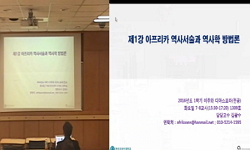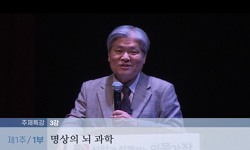Translation is an act occurring when two or more languages come into contact with each other, so it is based on otherness. And the otherness can come into the foreground or go to the background depending on the purpose of the translation or politics, ...
http://chineseinput.net/에서 pinyin(병음)방식으로 중국어를 변환할 수 있습니다.
변환된 중국어를 복사하여 사용하시면 됩니다.
- 中文 을 입력하시려면 zhongwen을 입력하시고 space를누르시면됩니다.
- 北京 을 입력하시려면 beijing을 입력하시고 space를 누르시면 됩니다.
부가정보
다국어 초록 (Multilingual Abstract)
Translation is an act occurring when two or more languages come into contact with each other, so it is based on otherness. And the otherness can come into the foreground or go to the background depending on the purpose of the translation or politics, power or ideological relationship that surrounds the translation. The relationship between linguistic subject and other has long been studied, and it is based on the assumption that the source text and the target text are written in one homogeneous language. However, deterritorialization and denationalization of literature that started from the end of colonialism present new translation issues that cannot be explained from the perspective of subject and other. Diaspora literature, which is written in other languages by diaspora who left their home country and settled in other countries, is situated in a “third space” and is born on the boundary between the residing country and home country, center and periphery, and assimilation and resistance, and one of its characteristics is linguistic hybridity. Especially, in the case of Korean diaspora literature in Japan, linguistic hybridity has resisting power that subverts the hierarchy between the imperial language and nation language and is directly linked to the identity of the diaspora since Korean diaspora literature in Japan implies contact, conflict and dynamics between the two languages. Through “The Other Side of August” by Yu Miri and “The Volcanic Island” by Kim Seokbeom, which are postcolonial hybrid texts, this study investigates how linguistic hybridity appears in these texts and how it is changed in the process of translation into Korean to deal with translation issues presented by hybrid texts and examine the possibility of translation of linguistic hybridity.
목차 (Table of Contents)
- 1. 들어가며
- 2. 선행 연구 고찰
- 3. 연구대상 및 연구방법
- 4. 실제 번역 예
- 4.1 『8月の果て』의 번역 예
- 1. 들어가며
- 2. 선행 연구 고찰
- 3. 연구대상 및 연구방법
- 4. 실제 번역 예
- 4.1 『8月の果て』의 번역 예
- 4.2 『火山島』의 번역 예
- 4. 나가며
- 參考文獻
-
- <要旨>
참고문헌 (Reference)
1 손종업, "柳美里의 「8월의 저편」과 言語의 문제" 한국어문교육연구회 40 (40): 325-348, 2012
2 애쉬크로프트, "포스트콜로니얼 문학이론" 민음사 1996
3 이재봉, "틈새 인간의 말더듬이 존재론 - 김학영과 그의 문학" 현대문학이론학회 (43) : 389-421, 2010
4 박미정, "탈식민주의 ‘문화번역’의 담론적 실천-유미리의 『8월の果て』를 중심으로-" 한국일본언어문화학회 (31) : 313-336, 2015
5 문재원, "재일코리안 디아스포라 문학사의 경계와 해체 - 현월과 가네시로 가즈키의 작품을 중심으로 -" 동북아시아문화학회 1 (1): 5-21, 2011
6 윤송아, "재일 한인 문학의 탈경계성과 수행성 연구" 동남어문학회 1 (1): 267-295, 2014
7 벤야민, B., "언어 일반과 인간의 언어에 대하여: 번역자의 과제 외" 도서출판 길 2008
8 메리 슈넬 혼비, "번역학 발전사" 이화여자대학교출판부 2010
9 정혜욱, "번역과 포스트식민주의" 한국현대영어영문학회 47 (47): 35-53, 2003
10 사카이 나오키, "번역과 주체" 이산 2005
1 손종업, "柳美里의 「8월의 저편」과 言語의 문제" 한국어문교육연구회 40 (40): 325-348, 2012
2 애쉬크로프트, "포스트콜로니얼 문학이론" 민음사 1996
3 이재봉, "틈새 인간의 말더듬이 존재론 - 김학영과 그의 문학" 현대문학이론학회 (43) : 389-421, 2010
4 박미정, "탈식민주의 ‘문화번역’의 담론적 실천-유미리의 『8월の果て』를 중심으로-" 한국일본언어문화학회 (31) : 313-336, 2015
5 문재원, "재일코리안 디아스포라 문학사의 경계와 해체 - 현월과 가네시로 가즈키의 작품을 중심으로 -" 동북아시아문화학회 1 (1): 5-21, 2011
6 윤송아, "재일 한인 문학의 탈경계성과 수행성 연구" 동남어문학회 1 (1): 267-295, 2014
7 벤야민, B., "언어 일반과 인간의 언어에 대하여: 번역자의 과제 외" 도서출판 길 2008
8 메리 슈넬 혼비, "번역학 발전사" 이화여자대학교출판부 2010
9 정혜욱, "번역과 포스트식민주의" 한국현대영어영문학회 47 (47): 35-53, 2003
10 사카이 나오키, "번역과 주체" 이산 2005
11 베르만, A., "번역과 문자: 먼것의 거처" 철학과 현실사 2011
12 이상빈, "문화번역의 텍스트적 재현과 ‘번역’ 이창래의 Native Speaker와 그 번역본을 중심으로" 통번역연구소 18 (18): 119-140, 2014
13 이상빈, "문화번역과 젠더번역에 관한 이론적 고찰" 통번역연구소 16 (16): 23-42, 2012
14 이경란, "문화번역’과 포스트식민 이주서사: 자메이카 킨케이드의 『루시』" 한국현대영미소설학회 19 (19): 57-81, 2012
15 이종은, "두 개의 말과 두 개의 성, 양가적 텍스트의 번역- 타하르 벤 젤룬의 『모래의 아이L'enfant de sable』" 세계문학비교학회 (48) : 247-269, 2014
16 선영아, "다언어 글쓰기와 번역의 문제" 인문학연구원 72 (72): 293-324, 2015
17 이상빈, "노마디즘 2" 휴머니스트 2002
18 이진경, "노마디즘 1" 휴머니스트 2002
19 김환기, "김석범ㆍ[화산도]ㆍ<제주4ㆍ3> - [화산도]의 역사적/문학사적 의미 -" 일본학연구소 41 : 1-18, 2015
20 선영아, "‘쁘띠 네그르’의 혀와 ‘부러진’ 프랑스어 - A. 쿠루마의 이중 언어적 글쓰기의 문제" 세계문학비교학회 (38) : 137-160, 2012
21 Meherez, S., "Rethinking Translation:discourse, subjectivity, ideology" Routledge 120-138, 1992
22 Bandia, P., "Code-Switching and Code-Mixing in African Creative Writing:Some Insights for Translation Studies" 9 (9): 139-153, 1996
동일학술지(권/호) 다른 논문
-
혼종성의 번역양상에 대한 일고찰-재일 디아스포라 문학을 중심으로-
- 한국일본언어문화학회
- 이나경
- 2016
- KCI등재
-
野上弥生子の明治期文学への考察-写生文から小説的作法への変遷を中心として-
- 한국일본언어문화학회
- 이정은
- 2016
- KCI등재
-
日本語の友人同士の会話におけるけなし行動について-性別による違いに注目して-
- 한국일본언어문화학회
- 임시은
- 2016
- KCI등재
-
- 한국일본언어문화학회
- 야노다카요시
- 2016
- KCI등재
분석정보
인용정보 인용지수 설명보기
학술지 이력
| 연월일 | 이력구분 | 이력상세 | 등재구분 |
|---|---|---|---|
| 2028 | 평가예정 | 재인증평가 신청대상 (재인증) | |
| 2022-01-01 | 평가 | 등재학술지 유지 (재인증) |  |
| 2019-01-01 | 평가 | 등재학술지 유지 (계속평가) |  |
| 2016-01-01 | 평가 | 등재학술지 유지 (계속평가) |  |
| 2012-01-01 | 평가 | 등재학술지 유지 (등재유지) |  |
| 2009-01-01 | 평가 | 등재학술지 선정 (등재후보2차) |  |
| 2008-01-01 | 평가 | 등재후보 1차 PASS (등재후보1차) |  |
| 2007-01-19 | 학회명변경 | 한글명 : 일본언어문화학회 -> 한국일본언어문화학회영문명 : 미등록 -> Japanese Language & Culture Association of Korea |  |
| 2007-01-01 | 평가 | 등재후보학술지 유지 (등재후보1차) |  |
| 2005-01-01 | 평가 | 등재후보학술지 선정 (신규평가) |  |
학술지 인용정보
| 기준연도 | WOS-KCI 통합IF(2년) | KCIF(2년) | KCIF(3년) |
|---|---|---|---|
| 2016 | 0.31 | 0.31 | 0.28 |
| KCIF(4년) | KCIF(5년) | 중심성지수(3년) | 즉시성지수 |
| 0.26 | 0.25 | 0.547 | 0.03 |




 eArticle
eArticle






